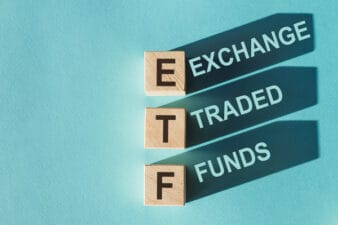It’s not easy for Canadian investors to choose a bank stock. Though all of the Big Six banks have performed relatively well over the long term, there have been some short-term difficulties recently, and each of the big banks has its own set of advantages and disadvantages, making choosing a bank stock challenging.
Exchange-traded funds
One option is to purchase an exchange-traded fund (ETF), which includes a basket of Canadian bank stocks, such as the BMO SP TSX Equal Weight Banks Index ETF (TSX:ZEB) or the iShares S&P TSX Capped Fncls Indx Fnd (TSX:XFN), which also includes insurance stocks for additional diversification.
BMO’s offering has been designed to replicate, as closely as possible, the performance of the S&P/TSX Equal Weight Diversified Banks Index. The fund invests in and holds the constituent securities of the TSX Index in the same proportion as they are reflected in the index. The BMO fund includes the Big Six banks, with percentage holdings ranging from 16.1% to 17.1%. The fund has lost 5% over the past year, a better performance than the Big Six banks individually.
The iShares ETF contains a slightly different mix than BMO’s fund, with investments in the Big Six banks plus insurance companies, including Manulife Financial Corp. and Sun Life Financial Inc. Royal Bank of Canada is the fund’s top holding, with nearly 20%. Year-to-date, the iShares fund is down 6.5%.
Royal Bank of Canada
If you’re more interested in a single stock purchase, why not start at the top with the country’s largest bank, Royal Bank of Canada (TSX:RY)(NYSE:RY)?
RBC has more than one trillion in assets, providing a wide array of diversified financial services, including personal and commercial banking, wealth management services, insurance, corporate and investment banking, and transaction processing services, serving 15 million clients.
RBC derives more than 70% of its net income from two of its five operating business segments, Canadian banking and capital markets, with wealth management adding another 12%, according to Morningstar data. “Despite the historical attractiveness of its home banking market, we think slower growth on the home front will continue to be a challenge,” said Morningstar analyst Dan Werner in a recent report.
Still, while weak oil prices are starting to affect asset quality at the big banks, the overall impact remains very small with little to indicate that there is significant credit or economic stress.
RBC’s earnings performance for its third quarter was solid, with personal and commercial banking leading the way. The bank earns substantial excess capital that it returns as dividends to shareholders, which have been raised seven times for a total increase of 50% since 2010. RBC’s current dividend is $0.79 a share, with a strong dividend yield of 4.4%.
Although ETFs provide a good option for investors seeking wider exposure to the banking sector, I believe that an individual bank stock offers better potential in the long term. Note that RBC’s Canadian banking business, which constitutes more than 50% of the bank’s profit, continues to provide returns on equity exceeding 30%. In addition, asset quality at RBC remains strong, with gross impaired loans as a percentage of total loans reaching just 0.5%.







